Budget Management, Auditing, and Compliance in Australia
VerifiedAdded on 2023/04/22
|10
|1972
|390
Report
AI Summary
This report provides a comprehensive overview of budget and financial management in an Australian context. It covers record-keeping requirements for businesses, including financial accounting programs, employee records, and sales records, as well as the legal requirements for maintaining these records. The report also discusses the audit process, including the records required for audit purposes and the penalties for non-compliance. Furthermore, it includes a practical section involving budget forecasting, variance analysis, and recommendations for improving financial performance, such as negotiating with suppliers and optimizing staffing arrangements. The analysis is based on a hypothetical business scenario, with considerations for adjusting budgets based on actual performance and market conditions.
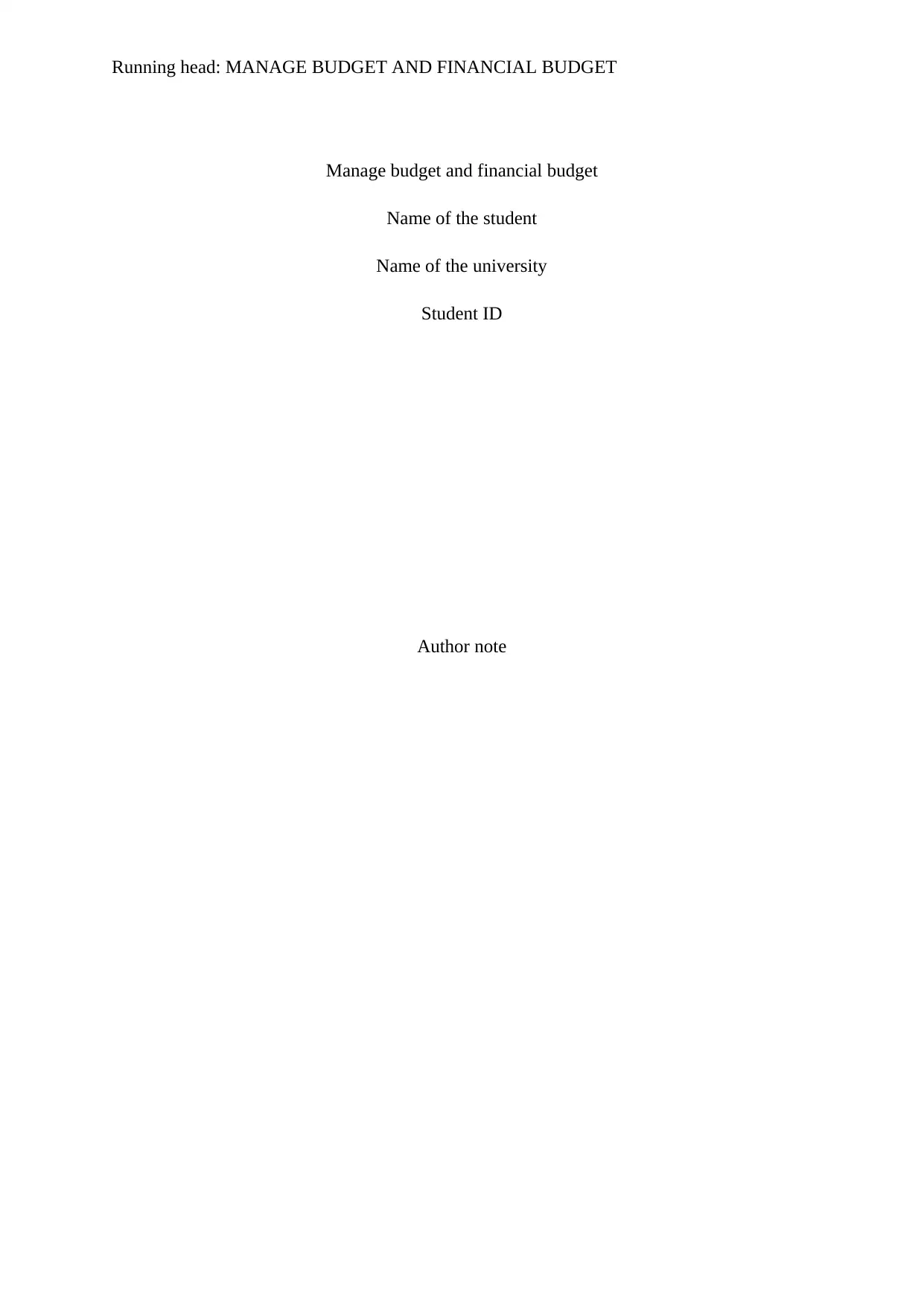
Running head: MANAGE BUDGET AND FINANCIAL BUDGET
Manage budget and financial budget
Name of the student
Name of the university
Student ID
Author note
Manage budget and financial budget
Name of the student
Name of the university
Student ID
Author note
Paraphrase This Document
Need a fresh take? Get an instant paraphrase of this document with our AI Paraphraser
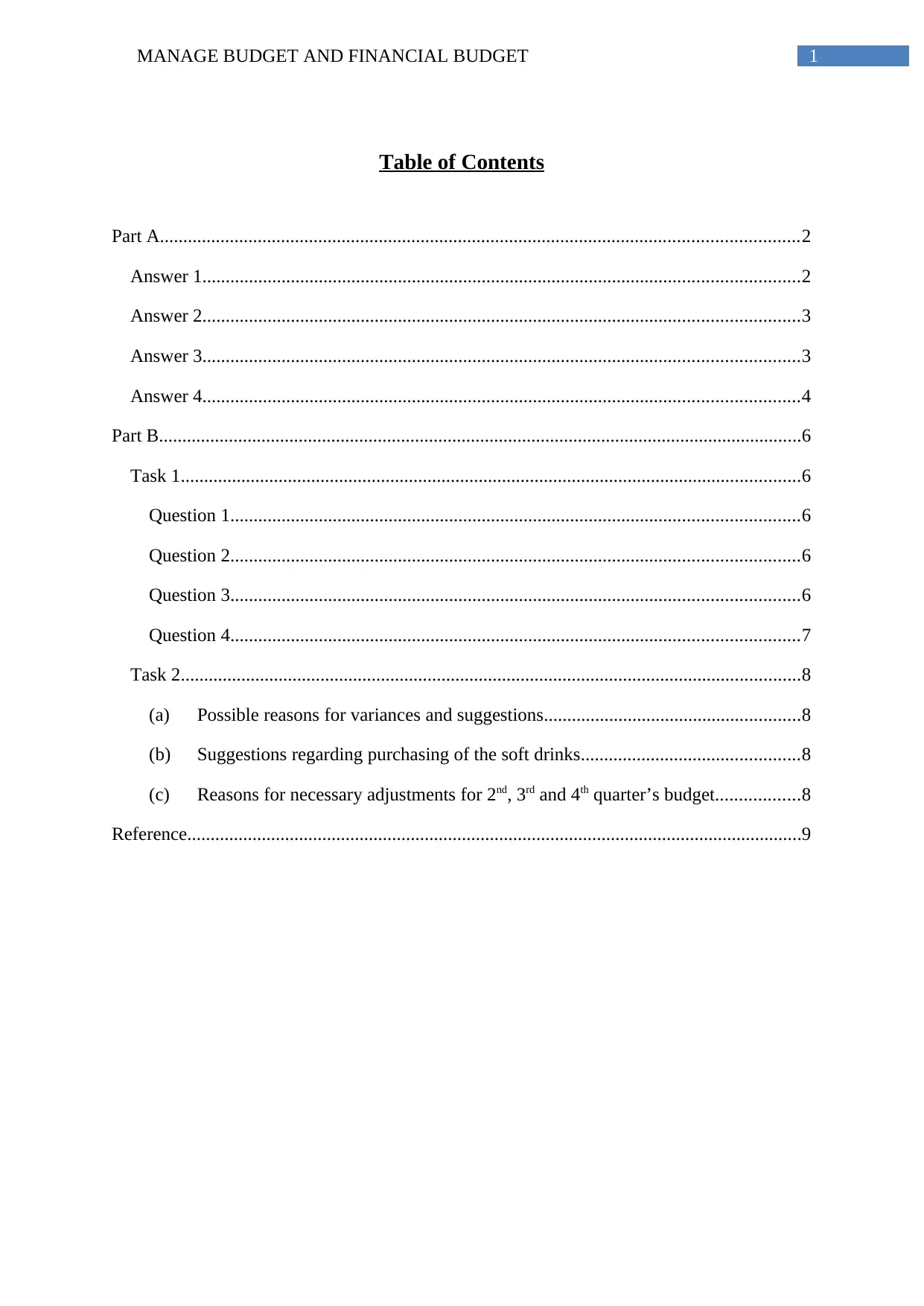
1MANAGE BUDGET AND FINANCIAL BUDGET
Table of Contents
Part A.........................................................................................................................................2
Answer 1................................................................................................................................2
Answer 2................................................................................................................................3
Answer 3................................................................................................................................3
Answer 4................................................................................................................................4
Part B..........................................................................................................................................6
Task 1.....................................................................................................................................6
Question 1..........................................................................................................................6
Question 2..........................................................................................................................6
Question 3..........................................................................................................................6
Question 4..........................................................................................................................7
Task 2.....................................................................................................................................8
(a) Possible reasons for variances and suggestions.......................................................8
(b) Suggestions regarding purchasing of the soft drinks...............................................8
(c) Reasons for necessary adjustments for 2nd, 3rd and 4th quarter’s budget..................8
Reference....................................................................................................................................9
Table of Contents
Part A.........................................................................................................................................2
Answer 1................................................................................................................................2
Answer 2................................................................................................................................3
Answer 3................................................................................................................................3
Answer 4................................................................................................................................4
Part B..........................................................................................................................................6
Task 1.....................................................................................................................................6
Question 1..........................................................................................................................6
Question 2..........................................................................................................................6
Question 3..........................................................................................................................6
Question 4..........................................................................................................................7
Task 2.....................................................................................................................................8
(a) Possible reasons for variances and suggestions.......................................................8
(b) Suggestions regarding purchasing of the soft drinks...............................................8
(c) Reasons for necessary adjustments for 2nd, 3rd and 4th quarter’s budget..................8
Reference....................................................................................................................................9
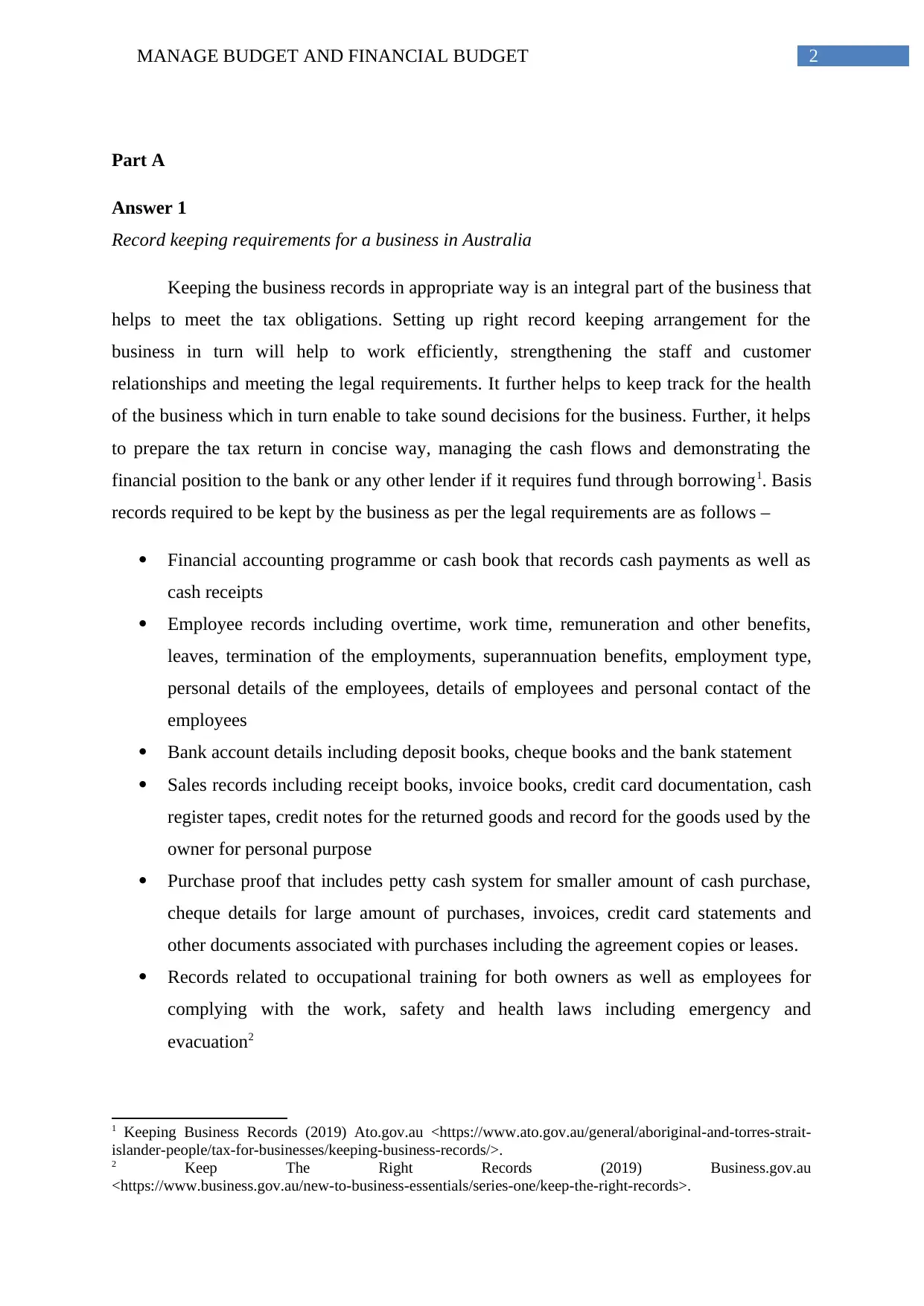
2MANAGE BUDGET AND FINANCIAL BUDGET
Part A
Answer 1
Record keeping requirements for a business in Australia
Keeping the business records in appropriate way is an integral part of the business that
helps to meet the tax obligations. Setting up right record keeping arrangement for the
business in turn will help to work efficiently, strengthening the staff and customer
relationships and meeting the legal requirements. It further helps to keep track for the health
of the business which in turn enable to take sound decisions for the business. Further, it helps
to prepare the tax return in concise way, managing the cash flows and demonstrating the
financial position to the bank or any other lender if it requires fund through borrowing1. Basis
records required to be kept by the business as per the legal requirements are as follows –
Financial accounting programme or cash book that records cash payments as well as
cash receipts
Employee records including overtime, work time, remuneration and other benefits,
leaves, termination of the employments, superannuation benefits, employment type,
personal details of the employees, details of employees and personal contact of the
employees
Bank account details including deposit books, cheque books and the bank statement
Sales records including receipt books, invoice books, credit card documentation, cash
register tapes, credit notes for the returned goods and record for the goods used by the
owner for personal purpose
Purchase proof that includes petty cash system for smaller amount of cash purchase,
cheque details for large amount of purchases, invoices, credit card statements and
other documents associated with purchases including the agreement copies or leases.
Records related to occupational training for both owners as well as employees for
complying with the work, safety and health laws including emergency and
evacuation2
1 Keeping Business Records (2019) Ato.gov.au <https://www.ato.gov.au/general/aboriginal-and-torres-strait-
islander-people/tax-for-businesses/keeping-business-records/>.
2 Keep The Right Records (2019) Business.gov.au
<https://www.business.gov.au/new-to-business-essentials/series-one/keep-the-right-records>.
Part A
Answer 1
Record keeping requirements for a business in Australia
Keeping the business records in appropriate way is an integral part of the business that
helps to meet the tax obligations. Setting up right record keeping arrangement for the
business in turn will help to work efficiently, strengthening the staff and customer
relationships and meeting the legal requirements. It further helps to keep track for the health
of the business which in turn enable to take sound decisions for the business. Further, it helps
to prepare the tax return in concise way, managing the cash flows and demonstrating the
financial position to the bank or any other lender if it requires fund through borrowing1. Basis
records required to be kept by the business as per the legal requirements are as follows –
Financial accounting programme or cash book that records cash payments as well as
cash receipts
Employee records including overtime, work time, remuneration and other benefits,
leaves, termination of the employments, superannuation benefits, employment type,
personal details of the employees, details of employees and personal contact of the
employees
Bank account details including deposit books, cheque books and the bank statement
Sales records including receipt books, invoice books, credit card documentation, cash
register tapes, credit notes for the returned goods and record for the goods used by the
owner for personal purpose
Purchase proof that includes petty cash system for smaller amount of cash purchase,
cheque details for large amount of purchases, invoices, credit card statements and
other documents associated with purchases including the agreement copies or leases.
Records related to occupational training for both owners as well as employees for
complying with the work, safety and health laws including emergency and
evacuation2
1 Keeping Business Records (2019) Ato.gov.au <https://www.ato.gov.au/general/aboriginal-and-torres-strait-
islander-people/tax-for-businesses/keeping-business-records/>.
2 Keep The Right Records (2019) Business.gov.au
<https://www.business.gov.au/new-to-business-essentials/series-one/keep-the-right-records>.
⊘ This is a preview!⊘
Do you want full access?
Subscribe today to unlock all pages.

Trusted by 1+ million students worldwide
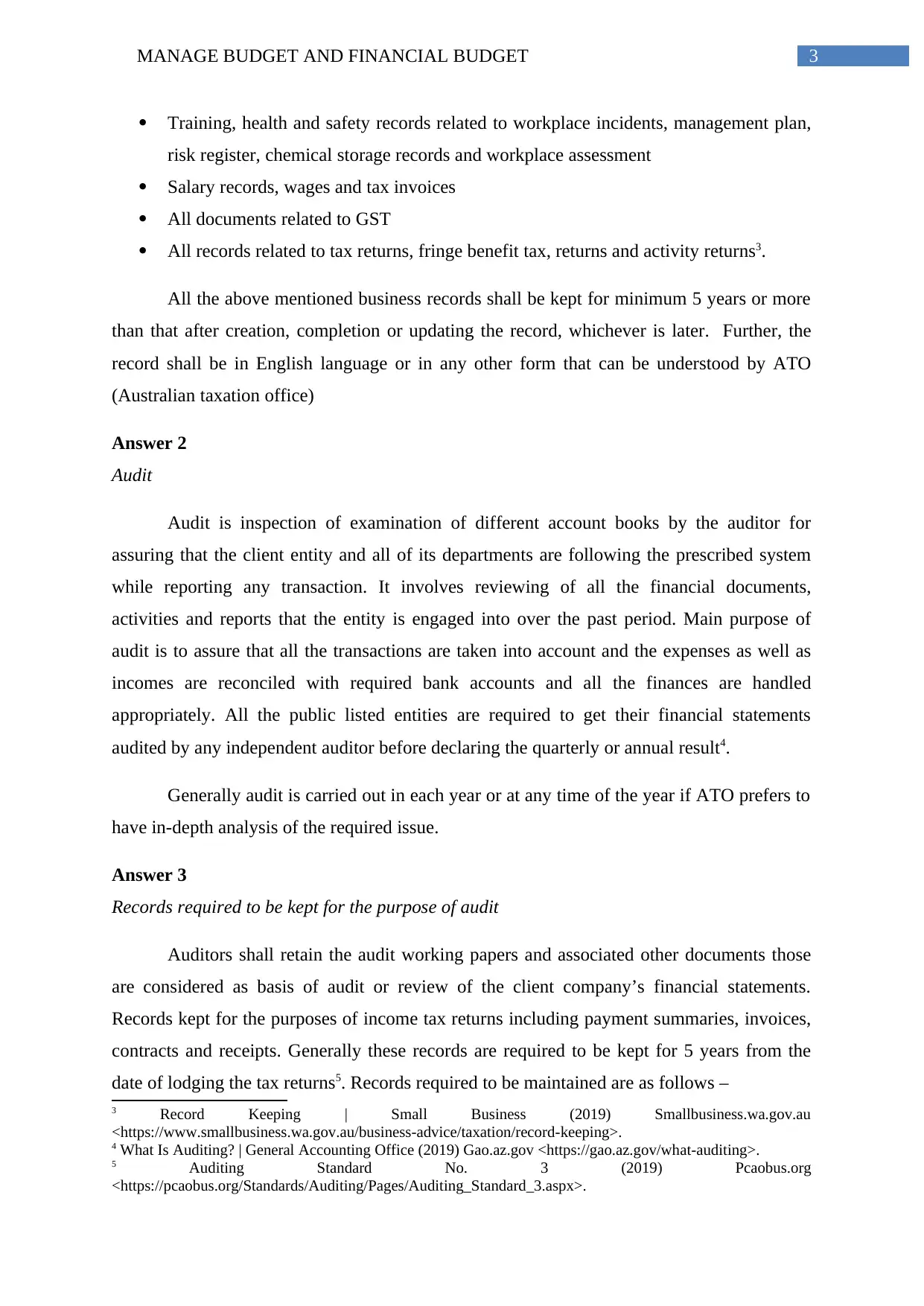
3MANAGE BUDGET AND FINANCIAL BUDGET
Training, health and safety records related to workplace incidents, management plan,
risk register, chemical storage records and workplace assessment
Salary records, wages and tax invoices
All documents related to GST
All records related to tax returns, fringe benefit tax, returns and activity returns3.
All the above mentioned business records shall be kept for minimum 5 years or more
than that after creation, completion or updating the record, whichever is later. Further, the
record shall be in English language or in any other form that can be understood by ATO
(Australian taxation office)
Answer 2
Audit
Audit is inspection of examination of different account books by the auditor for
assuring that the client entity and all of its departments are following the prescribed system
while reporting any transaction. It involves reviewing of all the financial documents,
activities and reports that the entity is engaged into over the past period. Main purpose of
audit is to assure that all the transactions are taken into account and the expenses as well as
incomes are reconciled with required bank accounts and all the finances are handled
appropriately. All the public listed entities are required to get their financial statements
audited by any independent auditor before declaring the quarterly or annual result4.
Generally audit is carried out in each year or at any time of the year if ATO prefers to
have in-depth analysis of the required issue.
Answer 3
Records required to be kept for the purpose of audit
Auditors shall retain the audit working papers and associated other documents those
are considered as basis of audit or review of the client company’s financial statements.
Records kept for the purposes of income tax returns including payment summaries, invoices,
contracts and receipts. Generally these records are required to be kept for 5 years from the
date of lodging the tax returns5. Records required to be maintained are as follows –
3 Record Keeping | Small Business (2019) Smallbusiness.wa.gov.au
<https://www.smallbusiness.wa.gov.au/business-advice/taxation/record-keeping>.
4 What Is Auditing? | General Accounting Office (2019) Gao.az.gov <https://gao.az.gov/what-auditing>.
5 Auditing Standard No. 3 (2019) Pcaobus.org
<https://pcaobus.org/Standards/Auditing/Pages/Auditing_Standard_3.aspx>.
Training, health and safety records related to workplace incidents, management plan,
risk register, chemical storage records and workplace assessment
Salary records, wages and tax invoices
All documents related to GST
All records related to tax returns, fringe benefit tax, returns and activity returns3.
All the above mentioned business records shall be kept for minimum 5 years or more
than that after creation, completion or updating the record, whichever is later. Further, the
record shall be in English language or in any other form that can be understood by ATO
(Australian taxation office)
Answer 2
Audit
Audit is inspection of examination of different account books by the auditor for
assuring that the client entity and all of its departments are following the prescribed system
while reporting any transaction. It involves reviewing of all the financial documents,
activities and reports that the entity is engaged into over the past period. Main purpose of
audit is to assure that all the transactions are taken into account and the expenses as well as
incomes are reconciled with required bank accounts and all the finances are handled
appropriately. All the public listed entities are required to get their financial statements
audited by any independent auditor before declaring the quarterly or annual result4.
Generally audit is carried out in each year or at any time of the year if ATO prefers to
have in-depth analysis of the required issue.
Answer 3
Records required to be kept for the purpose of audit
Auditors shall retain the audit working papers and associated other documents those
are considered as basis of audit or review of the client company’s financial statements.
Records kept for the purposes of income tax returns including payment summaries, invoices,
contracts and receipts. Generally these records are required to be kept for 5 years from the
date of lodging the tax returns5. Records required to be maintained are as follows –
3 Record Keeping | Small Business (2019) Smallbusiness.wa.gov.au
<https://www.smallbusiness.wa.gov.au/business-advice/taxation/record-keeping>.
4 What Is Auditing? | General Accounting Office (2019) Gao.az.gov <https://gao.az.gov/what-auditing>.
5 Auditing Standard No. 3 (2019) Pcaobus.org
<https://pcaobus.org/Standards/Auditing/Pages/Auditing_Standard_3.aspx>.
Paraphrase This Document
Need a fresh take? Get an instant paraphrase of this document with our AI Paraphraser
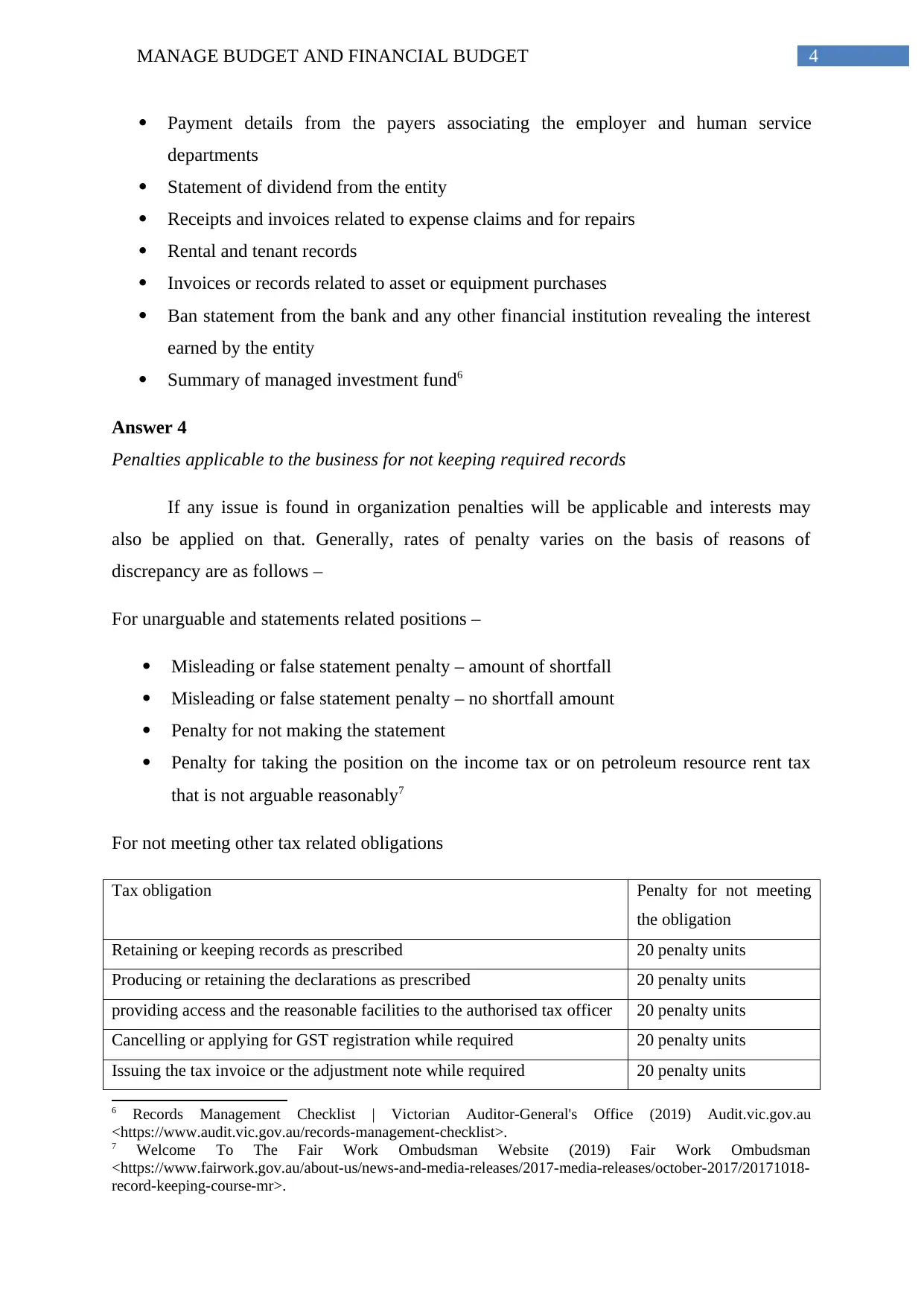
4MANAGE BUDGET AND FINANCIAL BUDGET
Payment details from the payers associating the employer and human service
departments
Statement of dividend from the entity
Receipts and invoices related to expense claims and for repairs
Rental and tenant records
Invoices or records related to asset or equipment purchases
Ban statement from the bank and any other financial institution revealing the interest
earned by the entity
Summary of managed investment fund6
Answer 4
Penalties applicable to the business for not keeping required records
If any issue is found in organization penalties will be applicable and interests may
also be applied on that. Generally, rates of penalty varies on the basis of reasons of
discrepancy are as follows –
For unarguable and statements related positions –
Misleading or false statement penalty – amount of shortfall
Misleading or false statement penalty – no shortfall amount
Penalty for not making the statement
Penalty for taking the position on the income tax or on petroleum resource rent tax
that is not arguable reasonably7
For not meeting other tax related obligations
Tax obligation Penalty for not meeting
the obligation
Retaining or keeping records as prescribed 20 penalty units
Producing or retaining the declarations as prescribed 20 penalty units
providing access and the reasonable facilities to the authorised tax officer 20 penalty units
Cancelling or applying for GST registration while required 20 penalty units
Issuing the tax invoice or the adjustment note while required 20 penalty units
6 Records Management Checklist | Victorian Auditor-General's Office (2019) Audit.vic.gov.au
<https://www.audit.vic.gov.au/records-management-checklist>.
7 Welcome To The Fair Work Ombudsman Website (2019) Fair Work Ombudsman
<https://www.fairwork.gov.au/about-us/news-and-media-releases/2017-media-releases/october-2017/20171018-
record-keeping-course-mr>.
Payment details from the payers associating the employer and human service
departments
Statement of dividend from the entity
Receipts and invoices related to expense claims and for repairs
Rental and tenant records
Invoices or records related to asset or equipment purchases
Ban statement from the bank and any other financial institution revealing the interest
earned by the entity
Summary of managed investment fund6
Answer 4
Penalties applicable to the business for not keeping required records
If any issue is found in organization penalties will be applicable and interests may
also be applied on that. Generally, rates of penalty varies on the basis of reasons of
discrepancy are as follows –
For unarguable and statements related positions –
Misleading or false statement penalty – amount of shortfall
Misleading or false statement penalty – no shortfall amount
Penalty for not making the statement
Penalty for taking the position on the income tax or on petroleum resource rent tax
that is not arguable reasonably7
For not meeting other tax related obligations
Tax obligation Penalty for not meeting
the obligation
Retaining or keeping records as prescribed 20 penalty units
Producing or retaining the declarations as prescribed 20 penalty units
providing access and the reasonable facilities to the authorised tax officer 20 penalty units
Cancelling or applying for GST registration while required 20 penalty units
Issuing the tax invoice or the adjustment note while required 20 penalty units
6 Records Management Checklist | Victorian Auditor-General's Office (2019) Audit.vic.gov.au
<https://www.audit.vic.gov.au/records-management-checklist>.
7 Welcome To The Fair Work Ombudsman Website (2019) Fair Work Ombudsman
<https://www.fairwork.gov.au/about-us/news-and-media-releases/2017-media-releases/october-2017/20171018-
record-keeping-course-mr>.
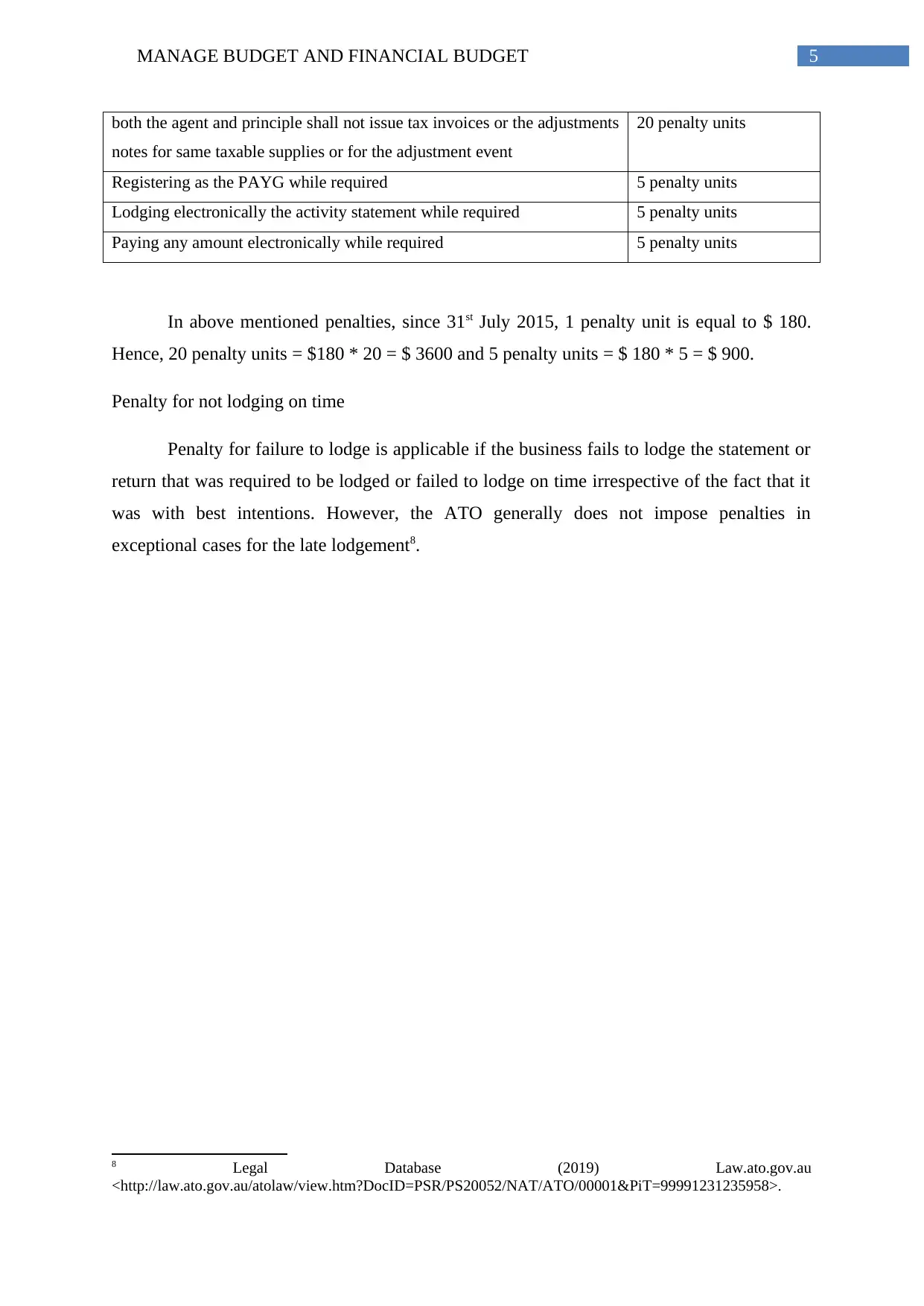
5MANAGE BUDGET AND FINANCIAL BUDGET
both the agent and principle shall not issue tax invoices or the adjustments
notes for same taxable supplies or for the adjustment event
20 penalty units
Registering as the PAYG while required 5 penalty units
Lodging electronically the activity statement while required 5 penalty units
Paying any amount electronically while required 5 penalty units
In above mentioned penalties, since 31st July 2015, 1 penalty unit is equal to $ 180.
Hence, 20 penalty units = $180 * 20 = $ 3600 and 5 penalty units = $ 180 * 5 = $ 900.
Penalty for not lodging on time
Penalty for failure to lodge is applicable if the business fails to lodge the statement or
return that was required to be lodged or failed to lodge on time irrespective of the fact that it
was with best intentions. However, the ATO generally does not impose penalties in
exceptional cases for the late lodgement8.
8 Legal Database (2019) Law.ato.gov.au
<http://law.ato.gov.au/atolaw/view.htm?DocID=PSR/PS20052/NAT/ATO/00001&PiT=99991231235958>.
both the agent and principle shall not issue tax invoices or the adjustments
notes for same taxable supplies or for the adjustment event
20 penalty units
Registering as the PAYG while required 5 penalty units
Lodging electronically the activity statement while required 5 penalty units
Paying any amount electronically while required 5 penalty units
In above mentioned penalties, since 31st July 2015, 1 penalty unit is equal to $ 180.
Hence, 20 penalty units = $180 * 20 = $ 3600 and 5 penalty units = $ 180 * 5 = $ 900.
Penalty for not lodging on time
Penalty for failure to lodge is applicable if the business fails to lodge the statement or
return that was required to be lodged or failed to lodge on time irrespective of the fact that it
was with best intentions. However, the ATO generally does not impose penalties in
exceptional cases for the late lodgement8.
8 Legal Database (2019) Law.ato.gov.au
<http://law.ato.gov.au/atolaw/view.htm?DocID=PSR/PS20052/NAT/ATO/00001&PiT=99991231235958>.
⊘ This is a preview!⊘
Do you want full access?
Subscribe today to unlock all pages.

Trusted by 1+ million students worldwide
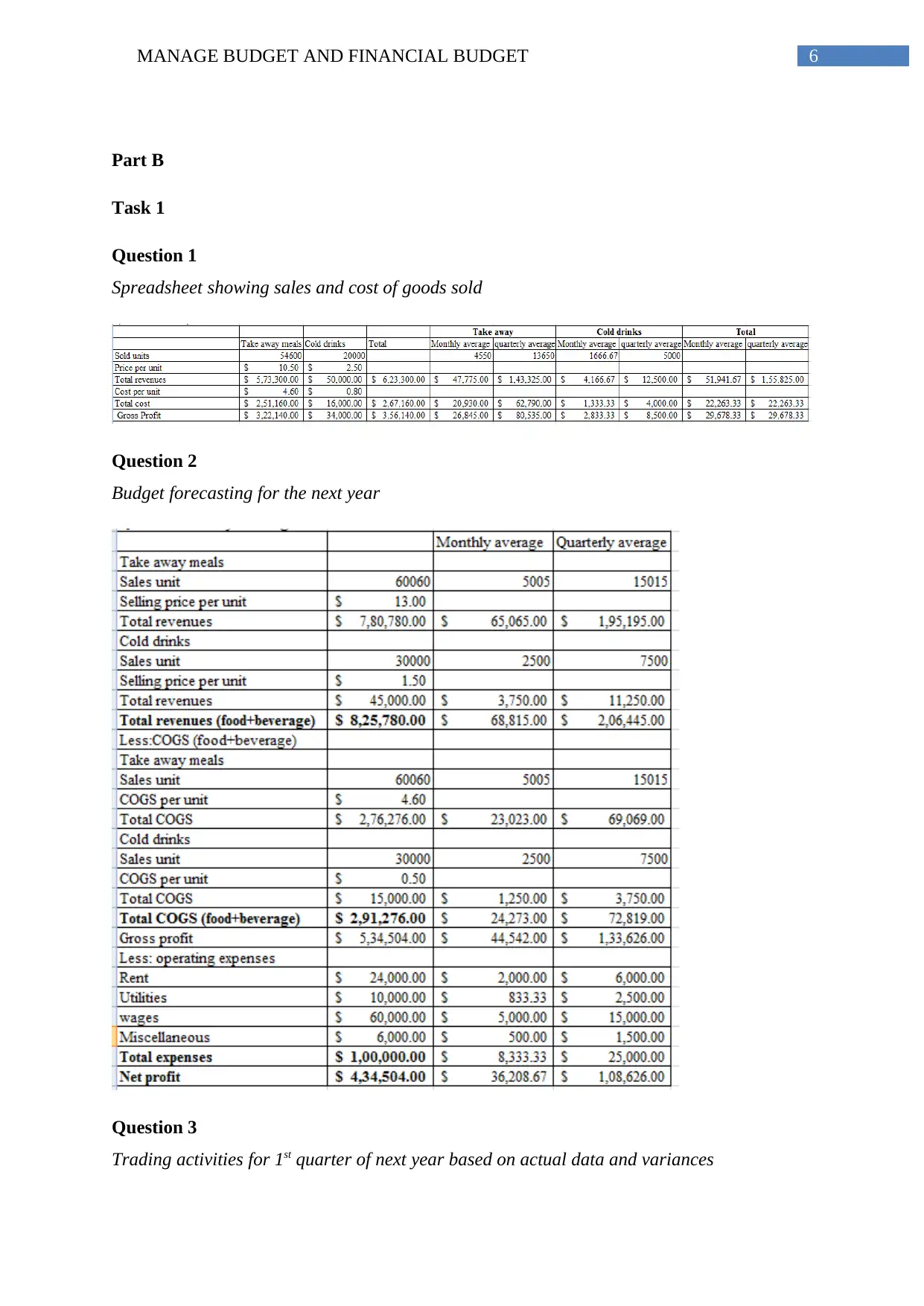
6MANAGE BUDGET AND FINANCIAL BUDGET
Part B
Task 1
Question 1
Spreadsheet showing sales and cost of goods sold
Question 2
Budget forecasting for the next year
Question 3
Trading activities for 1st quarter of next year based on actual data and variances
Part B
Task 1
Question 1
Spreadsheet showing sales and cost of goods sold
Question 2
Budget forecasting for the next year
Question 3
Trading activities for 1st quarter of next year based on actual data and variances
Paraphrase This Document
Need a fresh take? Get an instant paraphrase of this document with our AI Paraphraser
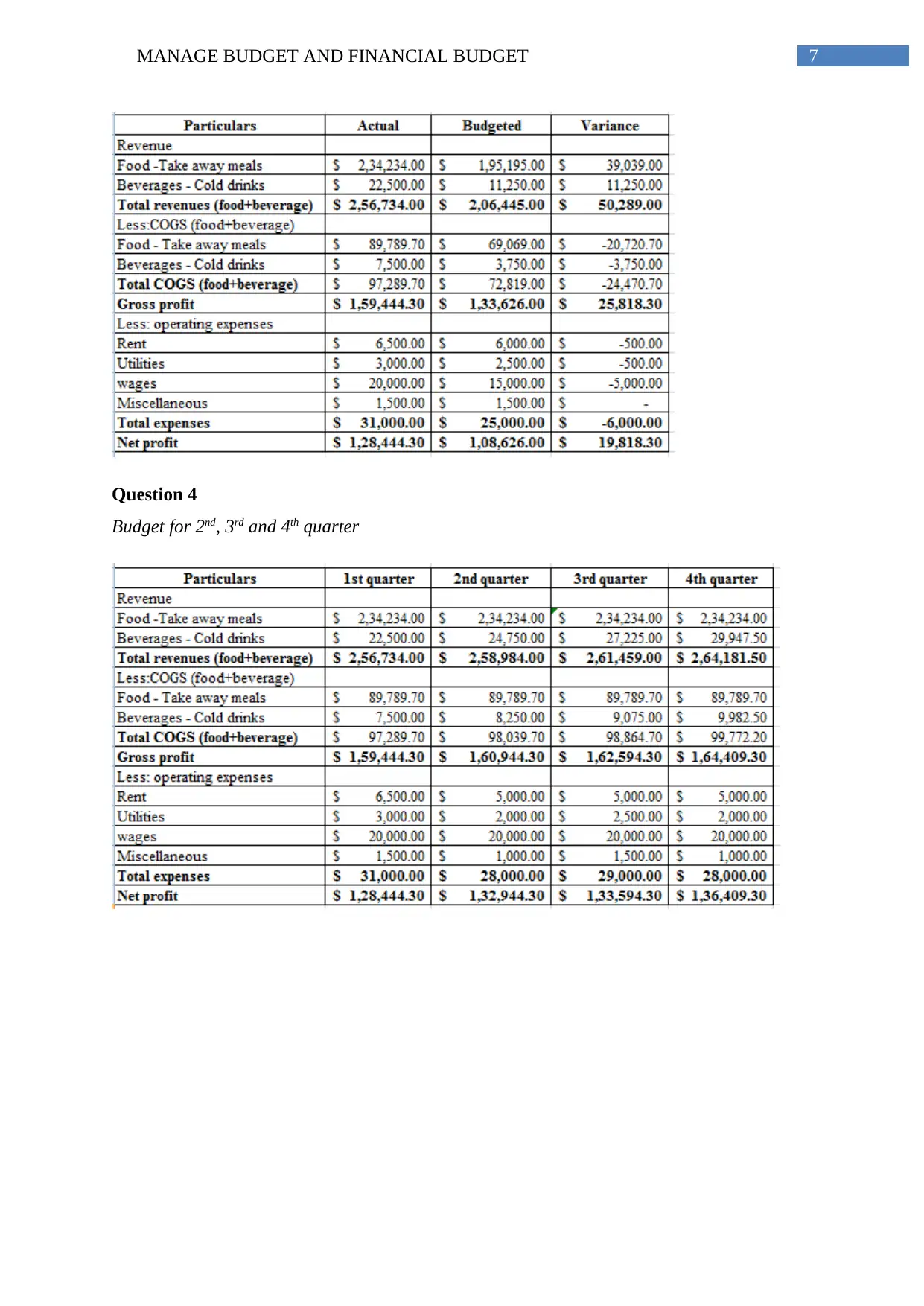
7MANAGE BUDGET AND FINANCIAL BUDGET
Question 4
Budget for 2nd, 3rd and 4th quarter
Question 4
Budget for 2nd, 3rd and 4th quarter
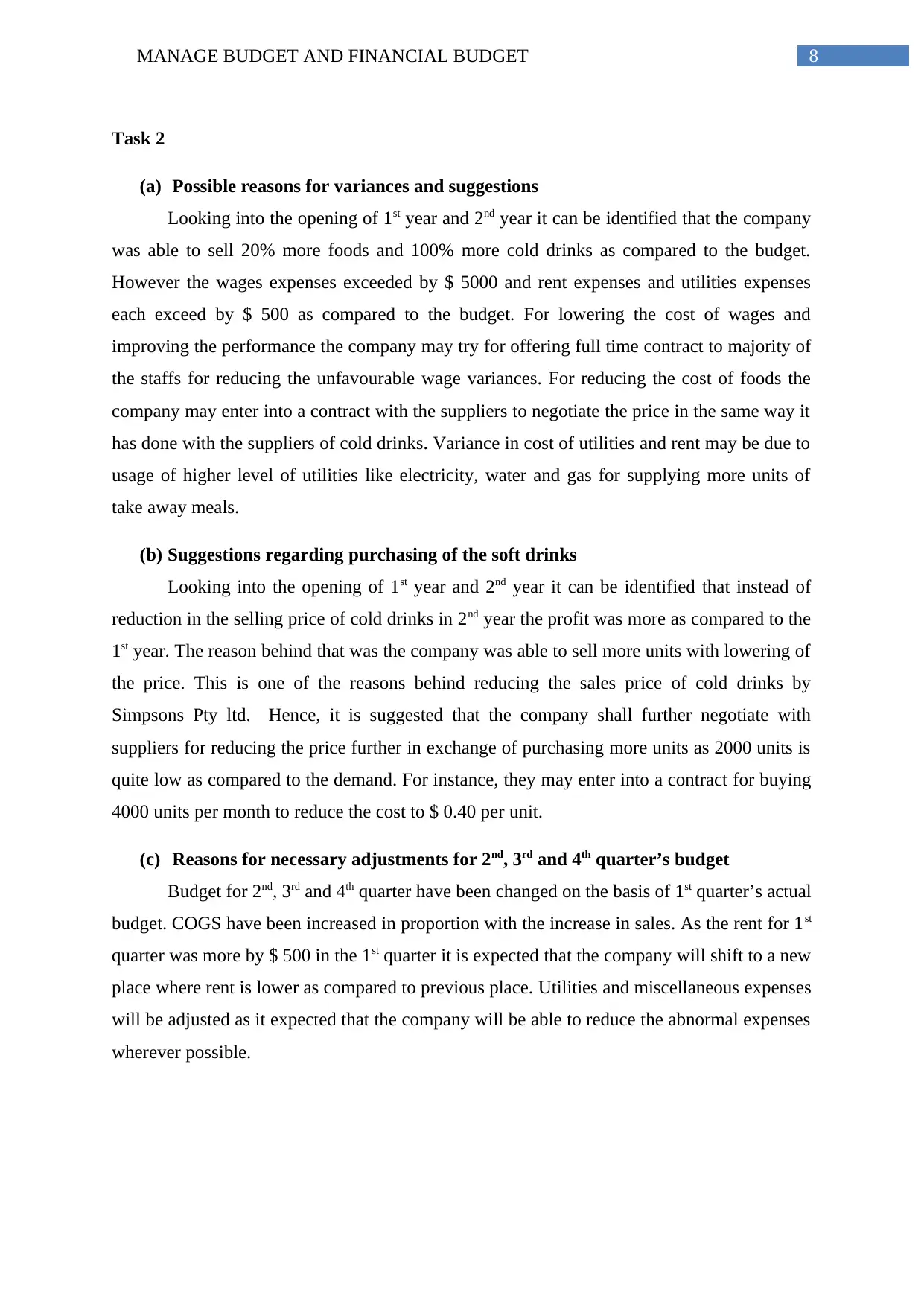
8MANAGE BUDGET AND FINANCIAL BUDGET
Task 2
(a) Possible reasons for variances and suggestions
Looking into the opening of 1st year and 2nd year it can be identified that the company
was able to sell 20% more foods and 100% more cold drinks as compared to the budget.
However the wages expenses exceeded by $ 5000 and rent expenses and utilities expenses
each exceed by $ 500 as compared to the budget. For lowering the cost of wages and
improving the performance the company may try for offering full time contract to majority of
the staffs for reducing the unfavourable wage variances. For reducing the cost of foods the
company may enter into a contract with the suppliers to negotiate the price in the same way it
has done with the suppliers of cold drinks. Variance in cost of utilities and rent may be due to
usage of higher level of utilities like electricity, water and gas for supplying more units of
take away meals.
(b) Suggestions regarding purchasing of the soft drinks
Looking into the opening of 1st year and 2nd year it can be identified that instead of
reduction in the selling price of cold drinks in 2nd year the profit was more as compared to the
1st year. The reason behind that was the company was able to sell more units with lowering of
the price. This is one of the reasons behind reducing the sales price of cold drinks by
Simpsons Pty ltd. Hence, it is suggested that the company shall further negotiate with
suppliers for reducing the price further in exchange of purchasing more units as 2000 units is
quite low as compared to the demand. For instance, they may enter into a contract for buying
4000 units per month to reduce the cost to $ 0.40 per unit.
(c) Reasons for necessary adjustments for 2nd, 3rd and 4th quarter’s budget
Budget for 2nd, 3rd and 4th quarter have been changed on the basis of 1st quarter’s actual
budget. COGS have been increased in proportion with the increase in sales. As the rent for 1st
quarter was more by $ 500 in the 1st quarter it is expected that the company will shift to a new
place where rent is lower as compared to previous place. Utilities and miscellaneous expenses
will be adjusted as it expected that the company will be able to reduce the abnormal expenses
wherever possible.
Task 2
(a) Possible reasons for variances and suggestions
Looking into the opening of 1st year and 2nd year it can be identified that the company
was able to sell 20% more foods and 100% more cold drinks as compared to the budget.
However the wages expenses exceeded by $ 5000 and rent expenses and utilities expenses
each exceed by $ 500 as compared to the budget. For lowering the cost of wages and
improving the performance the company may try for offering full time contract to majority of
the staffs for reducing the unfavourable wage variances. For reducing the cost of foods the
company may enter into a contract with the suppliers to negotiate the price in the same way it
has done with the suppliers of cold drinks. Variance in cost of utilities and rent may be due to
usage of higher level of utilities like electricity, water and gas for supplying more units of
take away meals.
(b) Suggestions regarding purchasing of the soft drinks
Looking into the opening of 1st year and 2nd year it can be identified that instead of
reduction in the selling price of cold drinks in 2nd year the profit was more as compared to the
1st year. The reason behind that was the company was able to sell more units with lowering of
the price. This is one of the reasons behind reducing the sales price of cold drinks by
Simpsons Pty ltd. Hence, it is suggested that the company shall further negotiate with
suppliers for reducing the price further in exchange of purchasing more units as 2000 units is
quite low as compared to the demand. For instance, they may enter into a contract for buying
4000 units per month to reduce the cost to $ 0.40 per unit.
(c) Reasons for necessary adjustments for 2nd, 3rd and 4th quarter’s budget
Budget for 2nd, 3rd and 4th quarter have been changed on the basis of 1st quarter’s actual
budget. COGS have been increased in proportion with the increase in sales. As the rent for 1st
quarter was more by $ 500 in the 1st quarter it is expected that the company will shift to a new
place where rent is lower as compared to previous place. Utilities and miscellaneous expenses
will be adjusted as it expected that the company will be able to reduce the abnormal expenses
wherever possible.
⊘ This is a preview!⊘
Do you want full access?
Subscribe today to unlock all pages.

Trusted by 1+ million students worldwide
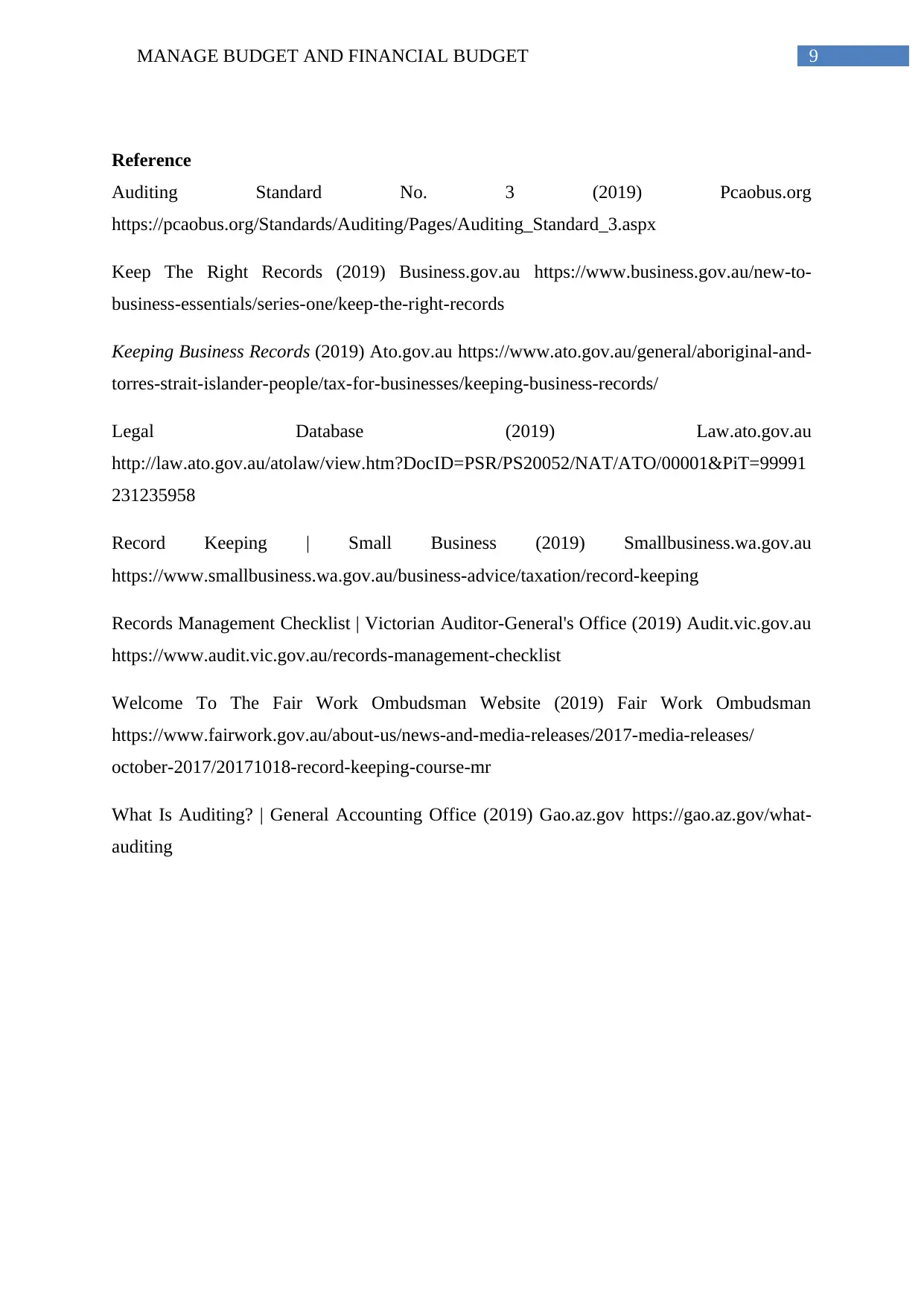
9MANAGE BUDGET AND FINANCIAL BUDGET
Reference
Auditing Standard No. 3 (2019) Pcaobus.org
https://pcaobus.org/Standards/Auditing/Pages/Auditing_Standard_3.aspx
Keep The Right Records (2019) Business.gov.au https://www.business.gov.au/new-to-
business-essentials/series-one/keep-the-right-records
Keeping Business Records (2019) Ato.gov.au https://www.ato.gov.au/general/aboriginal-and-
torres-strait-islander-people/tax-for-businesses/keeping-business-records/
Legal Database (2019) Law.ato.gov.au
http://law.ato.gov.au/atolaw/view.htm?DocID=PSR/PS20052/NAT/ATO/00001&PiT=99991
231235958
Record Keeping | Small Business (2019) Smallbusiness.wa.gov.au
https://www.smallbusiness.wa.gov.au/business-advice/taxation/record-keeping
Records Management Checklist | Victorian Auditor-General's Office (2019) Audit.vic.gov.au
https://www.audit.vic.gov.au/records-management-checklist
Welcome To The Fair Work Ombudsman Website (2019) Fair Work Ombudsman
https://www.fairwork.gov.au/about-us/news-and-media-releases/2017-media-releases/
october-2017/20171018-record-keeping-course-mr
What Is Auditing? | General Accounting Office (2019) Gao.az.gov https://gao.az.gov/what-
auditing
Reference
Auditing Standard No. 3 (2019) Pcaobus.org
https://pcaobus.org/Standards/Auditing/Pages/Auditing_Standard_3.aspx
Keep The Right Records (2019) Business.gov.au https://www.business.gov.au/new-to-
business-essentials/series-one/keep-the-right-records
Keeping Business Records (2019) Ato.gov.au https://www.ato.gov.au/general/aboriginal-and-
torres-strait-islander-people/tax-for-businesses/keeping-business-records/
Legal Database (2019) Law.ato.gov.au
http://law.ato.gov.au/atolaw/view.htm?DocID=PSR/PS20052/NAT/ATO/00001&PiT=99991
231235958
Record Keeping | Small Business (2019) Smallbusiness.wa.gov.au
https://www.smallbusiness.wa.gov.au/business-advice/taxation/record-keeping
Records Management Checklist | Victorian Auditor-General's Office (2019) Audit.vic.gov.au
https://www.audit.vic.gov.au/records-management-checklist
Welcome To The Fair Work Ombudsman Website (2019) Fair Work Ombudsman
https://www.fairwork.gov.au/about-us/news-and-media-releases/2017-media-releases/
october-2017/20171018-record-keeping-course-mr
What Is Auditing? | General Accounting Office (2019) Gao.az.gov https://gao.az.gov/what-
auditing
1 out of 10
Related Documents
Your All-in-One AI-Powered Toolkit for Academic Success.
+13062052269
info@desklib.com
Available 24*7 on WhatsApp / Email
![[object Object]](/_next/static/media/star-bottom.7253800d.svg)
Unlock your academic potential
Copyright © 2020–2026 A2Z Services. All Rights Reserved. Developed and managed by ZUCOL.





